Auditing and Assurance Services: Analysis of Factors Impacting Audit Quality in Australia
VerifiedAdded on 2022/11/17
|13
|3354
|306
AI Summary
This essay analyzes the factors impacting audit quality in Australia, including the use of advanced technology, conflict of interest, and initiatives by ASIC and PwC. It also discusses the restructuring of the code of ethics by IESBA to enhance audit quality.
Contribute Materials
Your contribution can guide someone’s learning journey. Share your
documents today.
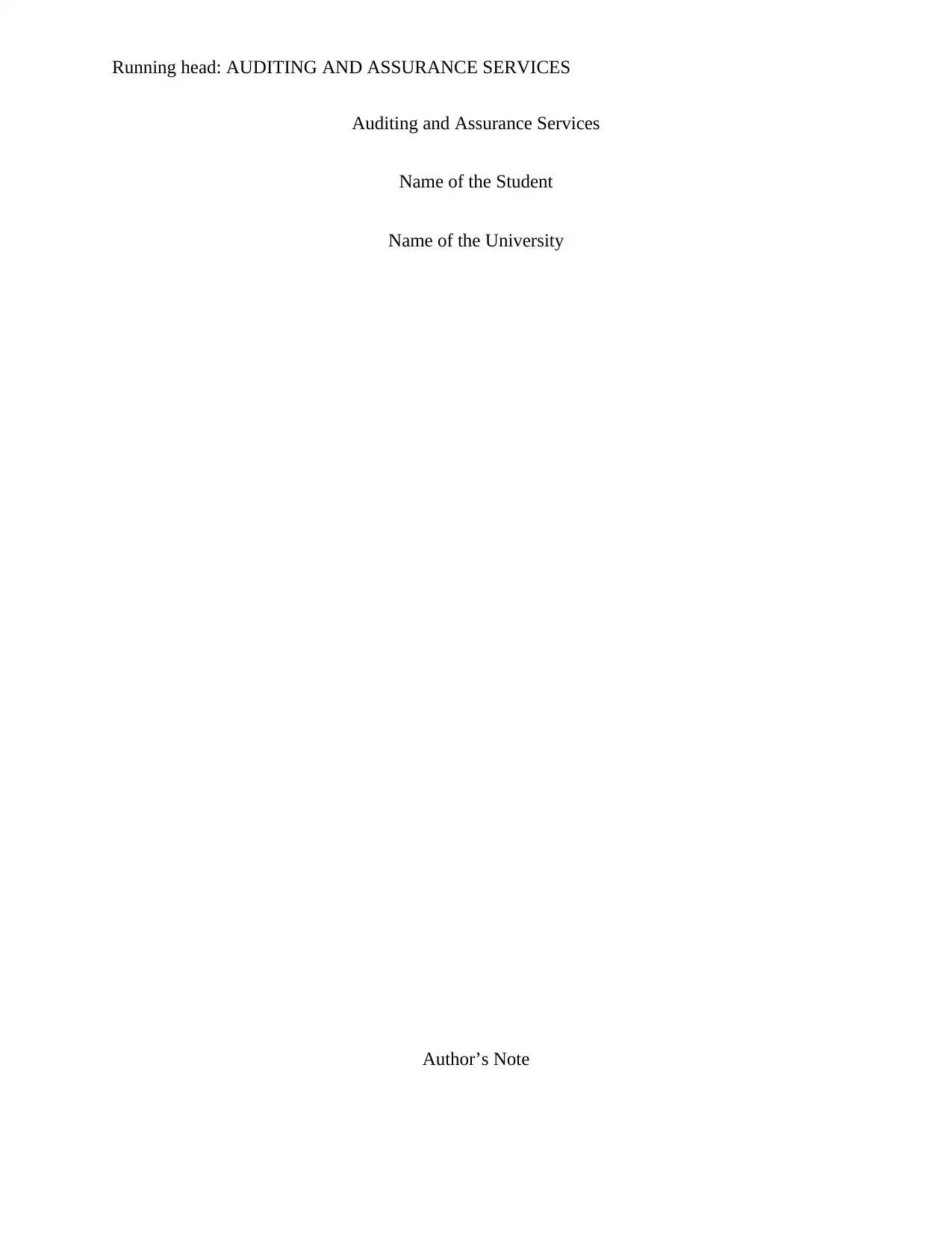
Running head: AUDITING AND ASSURANCE SERVICES
Auditing and Assurance Services
Name of the Student
Name of the University
Author’s Note
Auditing and Assurance Services
Name of the Student
Name of the University
Author’s Note
Secure Best Marks with AI Grader
Need help grading? Try our AI Grader for instant feedback on your assignments.
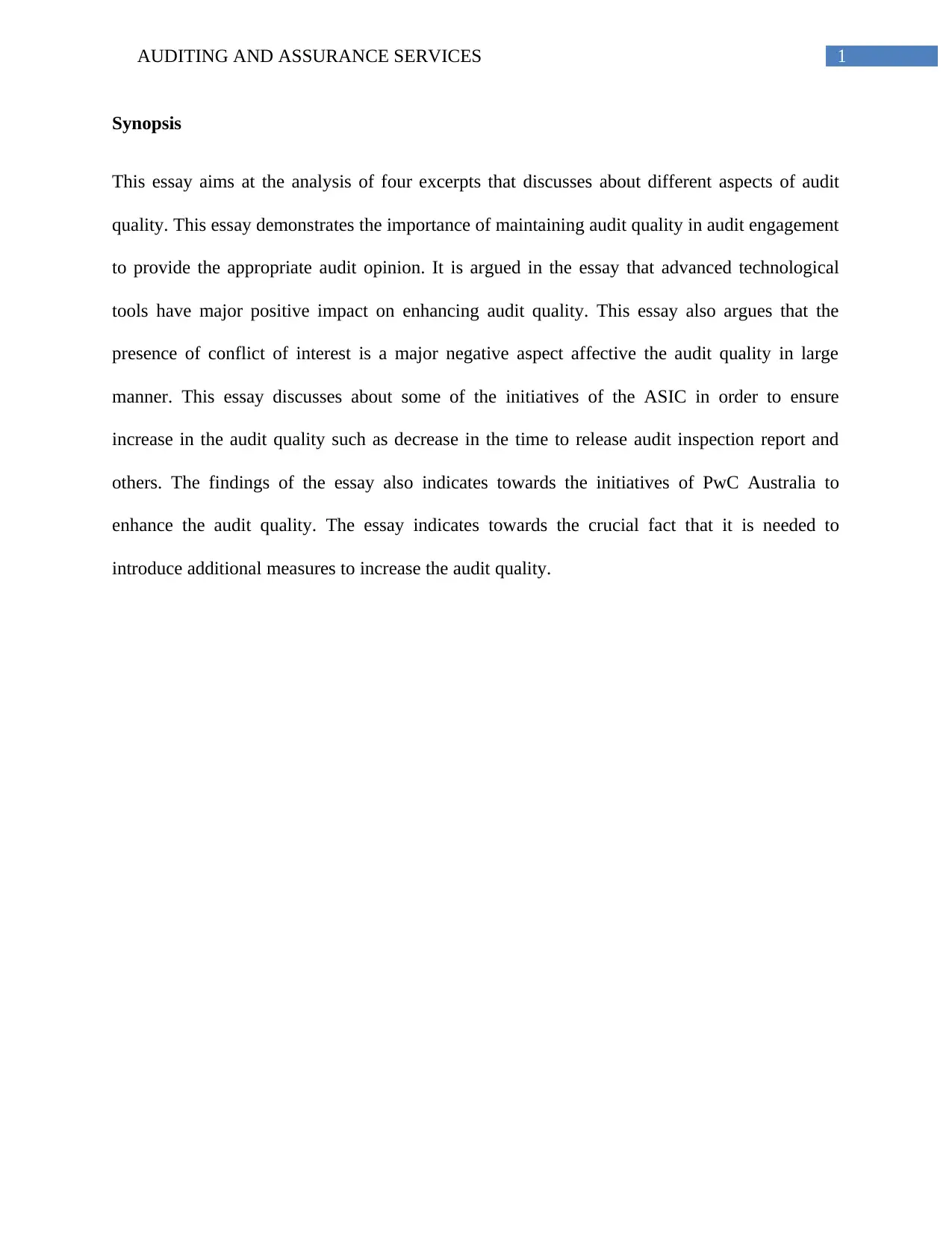
1AUDITING AND ASSURANCE SERVICES
Synopsis
This essay aims at the analysis of four excerpts that discusses about different aspects of audit
quality. This essay demonstrates the importance of maintaining audit quality in audit engagement
to provide the appropriate audit opinion. It is argued in the essay that advanced technological
tools have major positive impact on enhancing audit quality. This essay also argues that the
presence of conflict of interest is a major negative aspect affective the audit quality in large
manner. This essay discusses about some of the initiatives of the ASIC in order to ensure
increase in the audit quality such as decrease in the time to release audit inspection report and
others. The findings of the essay also indicates towards the initiatives of PwC Australia to
enhance the audit quality. The essay indicates towards the crucial fact that it is needed to
introduce additional measures to increase the audit quality.
Synopsis
This essay aims at the analysis of four excerpts that discusses about different aspects of audit
quality. This essay demonstrates the importance of maintaining audit quality in audit engagement
to provide the appropriate audit opinion. It is argued in the essay that advanced technological
tools have major positive impact on enhancing audit quality. This essay also argues that the
presence of conflict of interest is a major negative aspect affective the audit quality in large
manner. This essay discusses about some of the initiatives of the ASIC in order to ensure
increase in the audit quality such as decrease in the time to release audit inspection report and
others. The findings of the essay also indicates towards the initiatives of PwC Australia to
enhance the audit quality. The essay indicates towards the crucial fact that it is needed to
introduce additional measures to increase the audit quality.
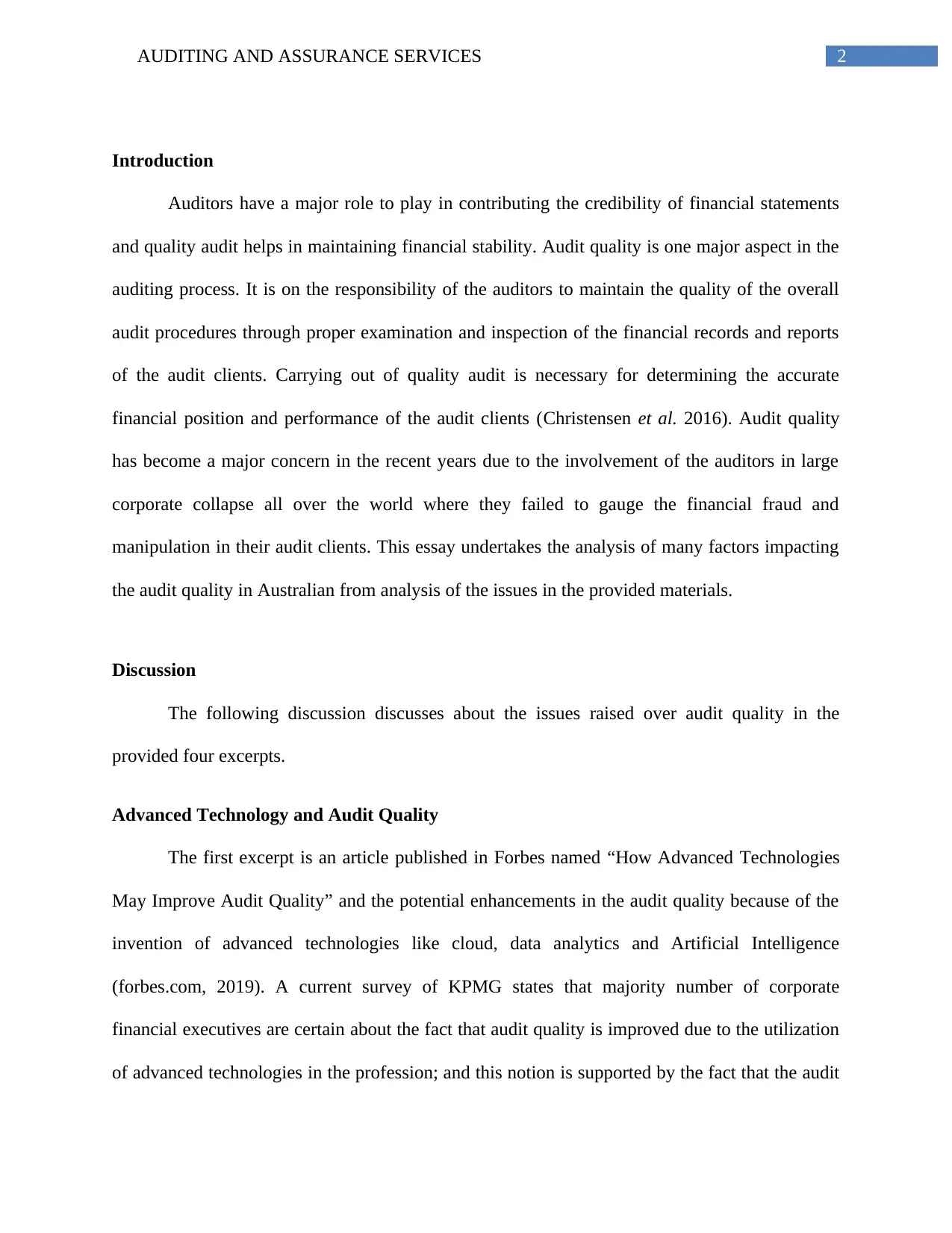
2AUDITING AND ASSURANCE SERVICES
Introduction
Auditors have a major role to play in contributing the credibility of financial statements
and quality audit helps in maintaining financial stability. Audit quality is one major aspect in the
auditing process. It is on the responsibility of the auditors to maintain the quality of the overall
audit procedures through proper examination and inspection of the financial records and reports
of the audit clients. Carrying out of quality audit is necessary for determining the accurate
financial position and performance of the audit clients (Christensen et al. 2016). Audit quality
has become a major concern in the recent years due to the involvement of the auditors in large
corporate collapse all over the world where they failed to gauge the financial fraud and
manipulation in their audit clients. This essay undertakes the analysis of many factors impacting
the audit quality in Australian from analysis of the issues in the provided materials.
Discussion
The following discussion discusses about the issues raised over audit quality in the
provided four excerpts.
Advanced Technology and Audit Quality
The first excerpt is an article published in Forbes named “How Advanced Technologies
May Improve Audit Quality” and the potential enhancements in the audit quality because of the
invention of advanced technologies like cloud, data analytics and Artificial Intelligence
(forbes.com, 2019). A current survey of KPMG states that majority number of corporate
financial executives are certain about the fact that audit quality is improved due to the utilization
of advanced technologies in the profession; and this notion is supported by the fact that the audit
Introduction
Auditors have a major role to play in contributing the credibility of financial statements
and quality audit helps in maintaining financial stability. Audit quality is one major aspect in the
auditing process. It is on the responsibility of the auditors to maintain the quality of the overall
audit procedures through proper examination and inspection of the financial records and reports
of the audit clients. Carrying out of quality audit is necessary for determining the accurate
financial position and performance of the audit clients (Christensen et al. 2016). Audit quality
has become a major concern in the recent years due to the involvement of the auditors in large
corporate collapse all over the world where they failed to gauge the financial fraud and
manipulation in their audit clients. This essay undertakes the analysis of many factors impacting
the audit quality in Australian from analysis of the issues in the provided materials.
Discussion
The following discussion discusses about the issues raised over audit quality in the
provided four excerpts.
Advanced Technology and Audit Quality
The first excerpt is an article published in Forbes named “How Advanced Technologies
May Improve Audit Quality” and the potential enhancements in the audit quality because of the
invention of advanced technologies like cloud, data analytics and Artificial Intelligence
(forbes.com, 2019). A current survey of KPMG states that majority number of corporate
financial executives are certain about the fact that audit quality is improved due to the utilization
of advanced technologies in the profession; and this notion is supported by the fact that the audit
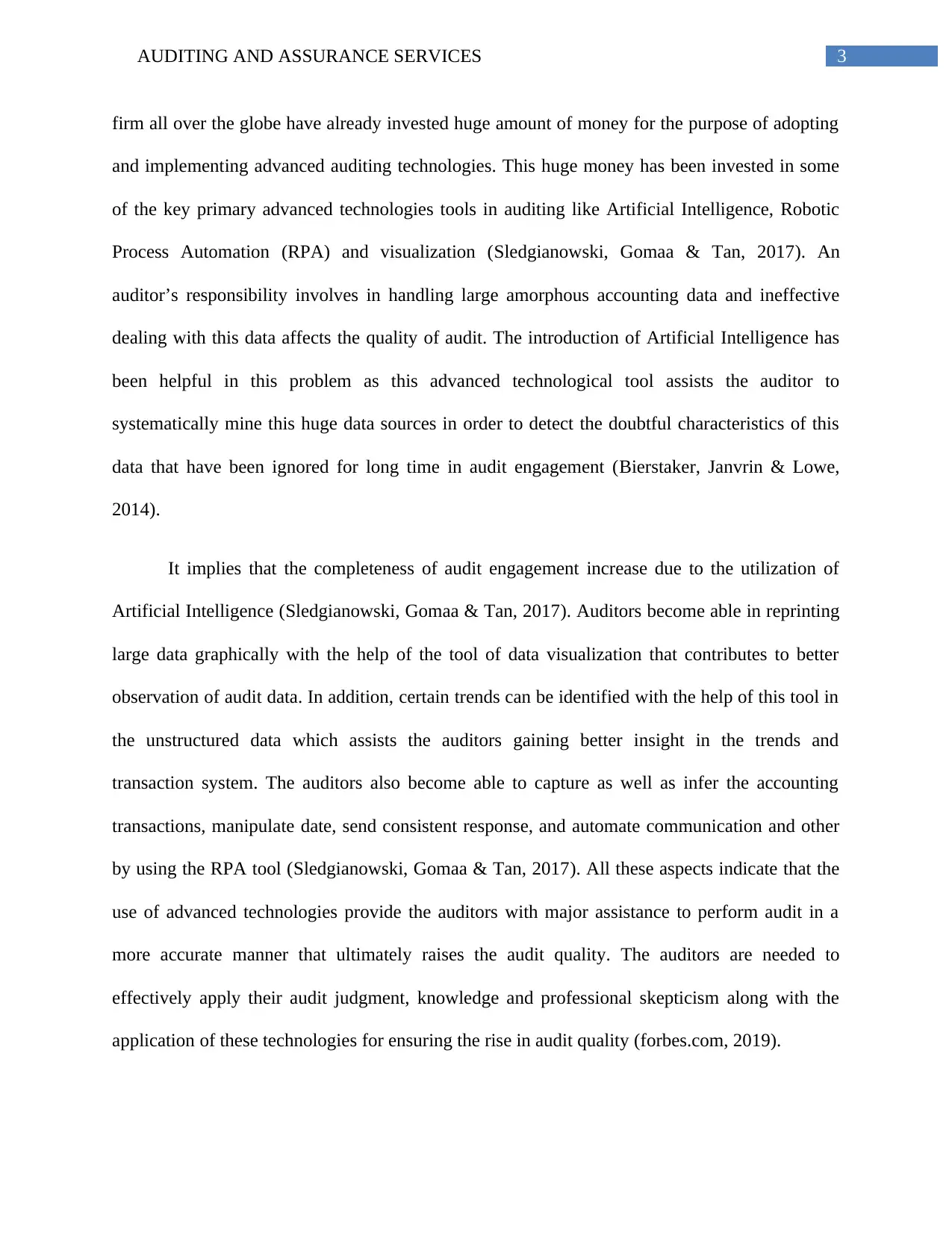
3AUDITING AND ASSURANCE SERVICES
firm all over the globe have already invested huge amount of money for the purpose of adopting
and implementing advanced auditing technologies. This huge money has been invested in some
of the key primary advanced technologies tools in auditing like Artificial Intelligence, Robotic
Process Automation (RPA) and visualization (Sledgianowski, Gomaa & Tan, 2017). An
auditor’s responsibility involves in handling large amorphous accounting data and ineffective
dealing with this data affects the quality of audit. The introduction of Artificial Intelligence has
been helpful in this problem as this advanced technological tool assists the auditor to
systematically mine this huge data sources in order to detect the doubtful characteristics of this
data that have been ignored for long time in audit engagement (Bierstaker, Janvrin & Lowe,
2014).
It implies that the completeness of audit engagement increase due to the utilization of
Artificial Intelligence (Sledgianowski, Gomaa & Tan, 2017). Auditors become able in reprinting
large data graphically with the help of the tool of data visualization that contributes to better
observation of audit data. In addition, certain trends can be identified with the help of this tool in
the unstructured data which assists the auditors gaining better insight in the trends and
transaction system. The auditors also become able to capture as well as infer the accounting
transactions, manipulate date, send consistent response, and automate communication and other
by using the RPA tool (Sledgianowski, Gomaa & Tan, 2017). All these aspects indicate that the
use of advanced technologies provide the auditors with major assistance to perform audit in a
more accurate manner that ultimately raises the audit quality. The auditors are needed to
effectively apply their audit judgment, knowledge and professional skepticism along with the
application of these technologies for ensuring the rise in audit quality (forbes.com, 2019).
firm all over the globe have already invested huge amount of money for the purpose of adopting
and implementing advanced auditing technologies. This huge money has been invested in some
of the key primary advanced technologies tools in auditing like Artificial Intelligence, Robotic
Process Automation (RPA) and visualization (Sledgianowski, Gomaa & Tan, 2017). An
auditor’s responsibility involves in handling large amorphous accounting data and ineffective
dealing with this data affects the quality of audit. The introduction of Artificial Intelligence has
been helpful in this problem as this advanced technological tool assists the auditor to
systematically mine this huge data sources in order to detect the doubtful characteristics of this
data that have been ignored for long time in audit engagement (Bierstaker, Janvrin & Lowe,
2014).
It implies that the completeness of audit engagement increase due to the utilization of
Artificial Intelligence (Sledgianowski, Gomaa & Tan, 2017). Auditors become able in reprinting
large data graphically with the help of the tool of data visualization that contributes to better
observation of audit data. In addition, certain trends can be identified with the help of this tool in
the unstructured data which assists the auditors gaining better insight in the trends and
transaction system. The auditors also become able to capture as well as infer the accounting
transactions, manipulate date, send consistent response, and automate communication and other
by using the RPA tool (Sledgianowski, Gomaa & Tan, 2017). All these aspects indicate that the
use of advanced technologies provide the auditors with major assistance to perform audit in a
more accurate manner that ultimately raises the audit quality. The auditors are needed to
effectively apply their audit judgment, knowledge and professional skepticism along with the
application of these technologies for ensuring the rise in audit quality (forbes.com, 2019).
Secure Best Marks with AI Grader
Need help grading? Try our AI Grader for instant feedback on your assignments.
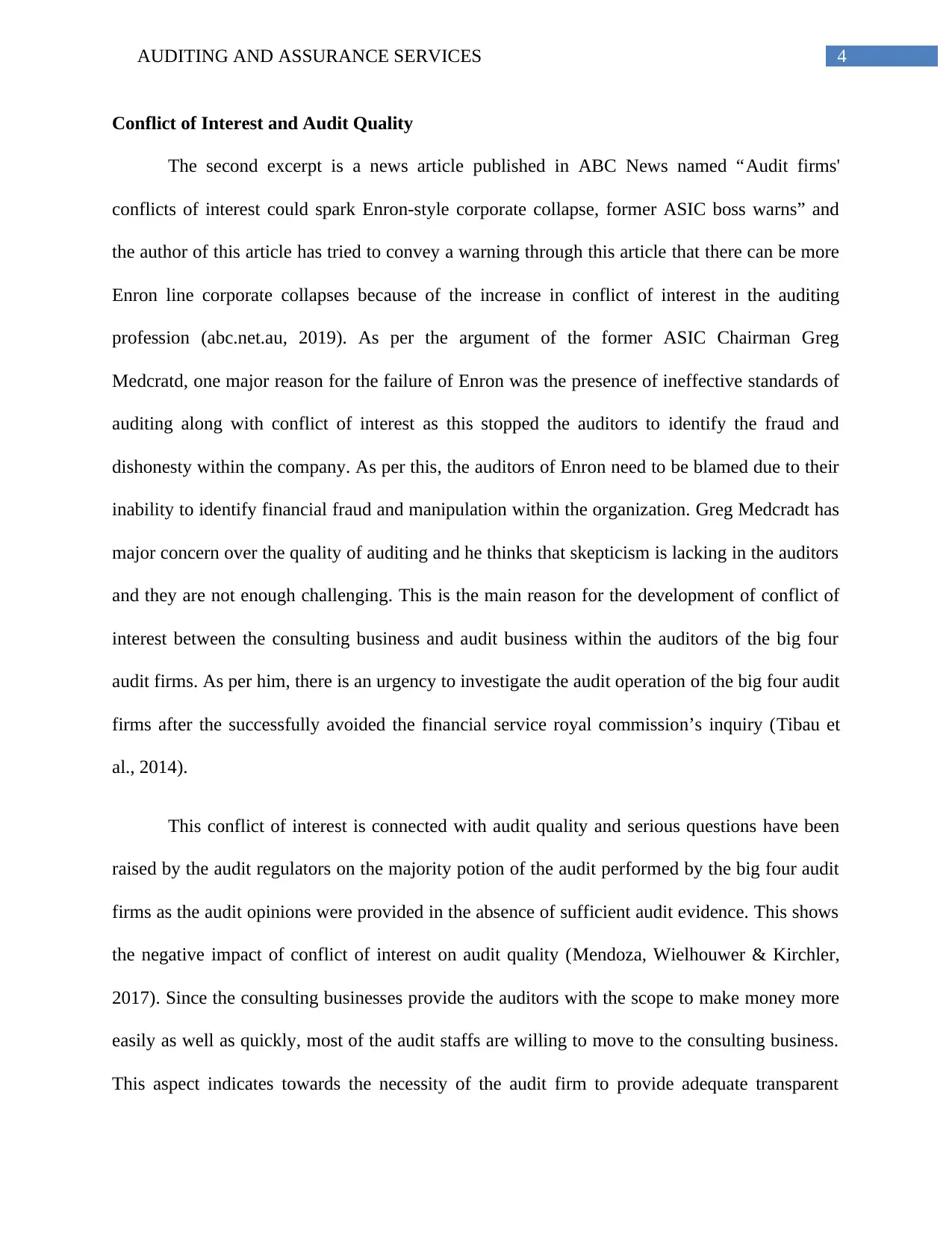
4AUDITING AND ASSURANCE SERVICES
Conflict of Interest and Audit Quality
The second excerpt is a news article published in ABC News named “Audit firms'
conflicts of interest could spark Enron-style corporate collapse, former ASIC boss warns” and
the author of this article has tried to convey a warning through this article that there can be more
Enron line corporate collapses because of the increase in conflict of interest in the auditing
profession (abc.net.au, 2019). As per the argument of the former ASIC Chairman Greg
Medcratd, one major reason for the failure of Enron was the presence of ineffective standards of
auditing along with conflict of interest as this stopped the auditors to identify the fraud and
dishonesty within the company. As per this, the auditors of Enron need to be blamed due to their
inability to identify financial fraud and manipulation within the organization. Greg Medcradt has
major concern over the quality of auditing and he thinks that skepticism is lacking in the auditors
and they are not enough challenging. This is the main reason for the development of conflict of
interest between the consulting business and audit business within the auditors of the big four
audit firms. As per him, there is an urgency to investigate the audit operation of the big four audit
firms after the successfully avoided the financial service royal commission’s inquiry (Tibau et
al., 2014).
This conflict of interest is connected with audit quality and serious questions have been
raised by the audit regulators on the majority potion of the audit performed by the big four audit
firms as the audit opinions were provided in the absence of sufficient audit evidence. This shows
the negative impact of conflict of interest on audit quality (Mendoza, Wielhouwer & Kirchler,
2017). Since the consulting businesses provide the auditors with the scope to make money more
easily as well as quickly, most of the audit staffs are willing to move to the consulting business.
This aspect indicates towards the necessity of the audit firm to provide adequate transparent
Conflict of Interest and Audit Quality
The second excerpt is a news article published in ABC News named “Audit firms'
conflicts of interest could spark Enron-style corporate collapse, former ASIC boss warns” and
the author of this article has tried to convey a warning through this article that there can be more
Enron line corporate collapses because of the increase in conflict of interest in the auditing
profession (abc.net.au, 2019). As per the argument of the former ASIC Chairman Greg
Medcratd, one major reason for the failure of Enron was the presence of ineffective standards of
auditing along with conflict of interest as this stopped the auditors to identify the fraud and
dishonesty within the company. As per this, the auditors of Enron need to be blamed due to their
inability to identify financial fraud and manipulation within the organization. Greg Medcradt has
major concern over the quality of auditing and he thinks that skepticism is lacking in the auditors
and they are not enough challenging. This is the main reason for the development of conflict of
interest between the consulting business and audit business within the auditors of the big four
audit firms. As per him, there is an urgency to investigate the audit operation of the big four audit
firms after the successfully avoided the financial service royal commission’s inquiry (Tibau et
al., 2014).
This conflict of interest is connected with audit quality and serious questions have been
raised by the audit regulators on the majority potion of the audit performed by the big four audit
firms as the audit opinions were provided in the absence of sufficient audit evidence. This shows
the negative impact of conflict of interest on audit quality (Mendoza, Wielhouwer & Kirchler,
2017). Since the consulting businesses provide the auditors with the scope to make money more
easily as well as quickly, most of the audit staffs are willing to move to the consulting business.
This aspect indicates towards the necessity of the audit firm to provide adequate transparent
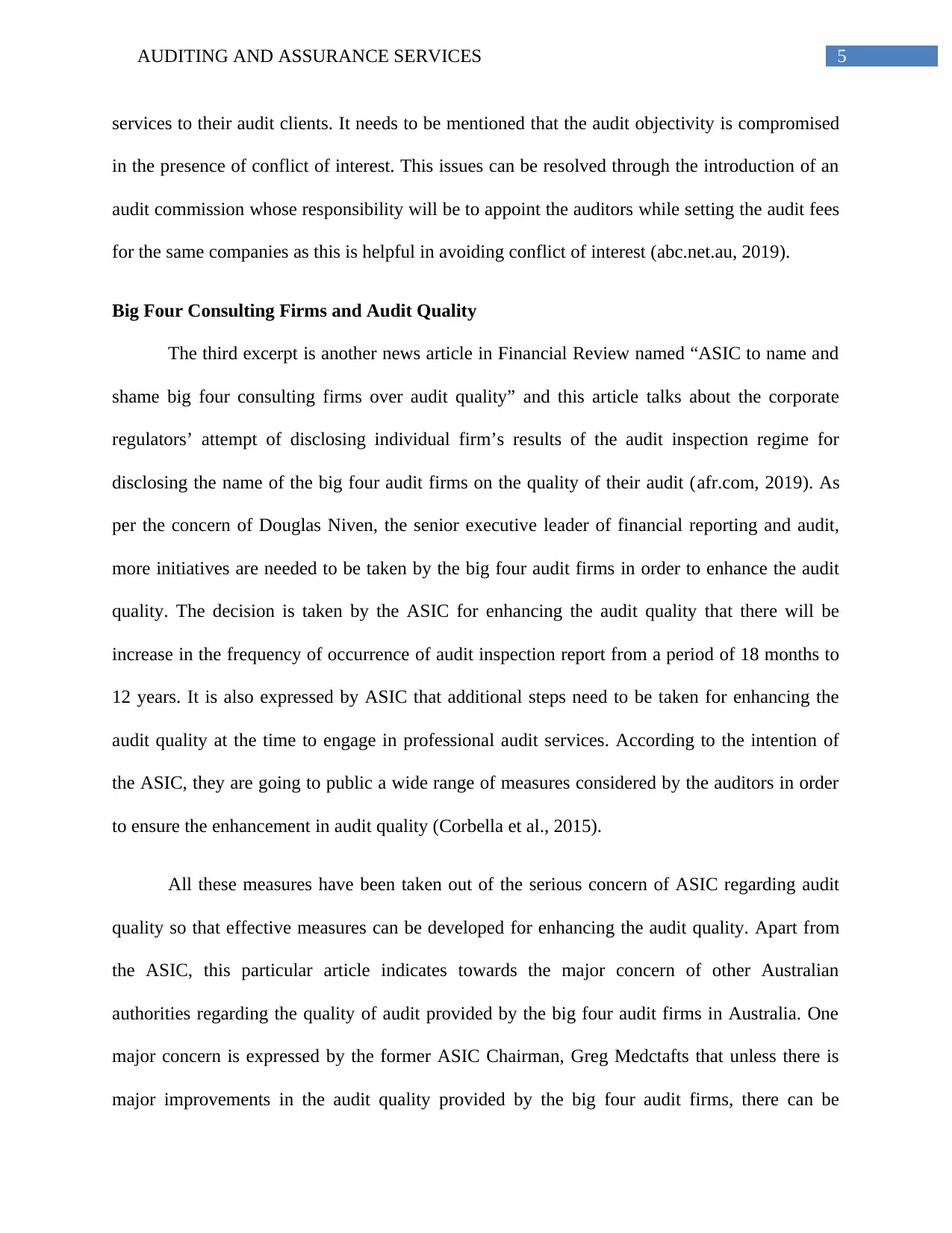
5AUDITING AND ASSURANCE SERVICES
services to their audit clients. It needs to be mentioned that the audit objectivity is compromised
in the presence of conflict of interest. This issues can be resolved through the introduction of an
audit commission whose responsibility will be to appoint the auditors while setting the audit fees
for the same companies as this is helpful in avoiding conflict of interest (abc.net.au, 2019).
Big Four Consulting Firms and Audit Quality
The third excerpt is another news article in Financial Review named “ASIC to name and
shame big four consulting firms over audit quality” and this article talks about the corporate
regulators’ attempt of disclosing individual firm’s results of the audit inspection regime for
disclosing the name of the big four audit firms on the quality of their audit (afr.com, 2019). As
per the concern of Douglas Niven, the senior executive leader of financial reporting and audit,
more initiatives are needed to be taken by the big four audit firms in order to enhance the audit
quality. The decision is taken by the ASIC for enhancing the audit quality that there will be
increase in the frequency of occurrence of audit inspection report from a period of 18 months to
12 years. It is also expressed by ASIC that additional steps need to be taken for enhancing the
audit quality at the time to engage in professional audit services. According to the intention of
the ASIC, they are going to public a wide range of measures considered by the auditors in order
to ensure the enhancement in audit quality (Corbella et al., 2015).
All these measures have been taken out of the serious concern of ASIC regarding audit
quality so that effective measures can be developed for enhancing the audit quality. Apart from
the ASIC, this particular article indicates towards the major concern of other Australian
authorities regarding the quality of audit provided by the big four audit firms in Australia. One
major concern is expressed by the former ASIC Chairman, Greg Medctafts that unless there is
major improvements in the audit quality provided by the big four audit firms, there can be
services to their audit clients. It needs to be mentioned that the audit objectivity is compromised
in the presence of conflict of interest. This issues can be resolved through the introduction of an
audit commission whose responsibility will be to appoint the auditors while setting the audit fees
for the same companies as this is helpful in avoiding conflict of interest (abc.net.au, 2019).
Big Four Consulting Firms and Audit Quality
The third excerpt is another news article in Financial Review named “ASIC to name and
shame big four consulting firms over audit quality” and this article talks about the corporate
regulators’ attempt of disclosing individual firm’s results of the audit inspection regime for
disclosing the name of the big four audit firms on the quality of their audit (afr.com, 2019). As
per the concern of Douglas Niven, the senior executive leader of financial reporting and audit,
more initiatives are needed to be taken by the big four audit firms in order to enhance the audit
quality. The decision is taken by the ASIC for enhancing the audit quality that there will be
increase in the frequency of occurrence of audit inspection report from a period of 18 months to
12 years. It is also expressed by ASIC that additional steps need to be taken for enhancing the
audit quality at the time to engage in professional audit services. According to the intention of
the ASIC, they are going to public a wide range of measures considered by the auditors in order
to ensure the enhancement in audit quality (Corbella et al., 2015).
All these measures have been taken out of the serious concern of ASIC regarding audit
quality so that effective measures can be developed for enhancing the audit quality. Apart from
the ASIC, this particular article indicates towards the major concern of other Australian
authorities regarding the quality of audit provided by the big four audit firms in Australia. One
major concern is expressed by the former ASIC Chairman, Greg Medctafts that unless there is
major improvements in the audit quality provided by the big four audit firms, there can be
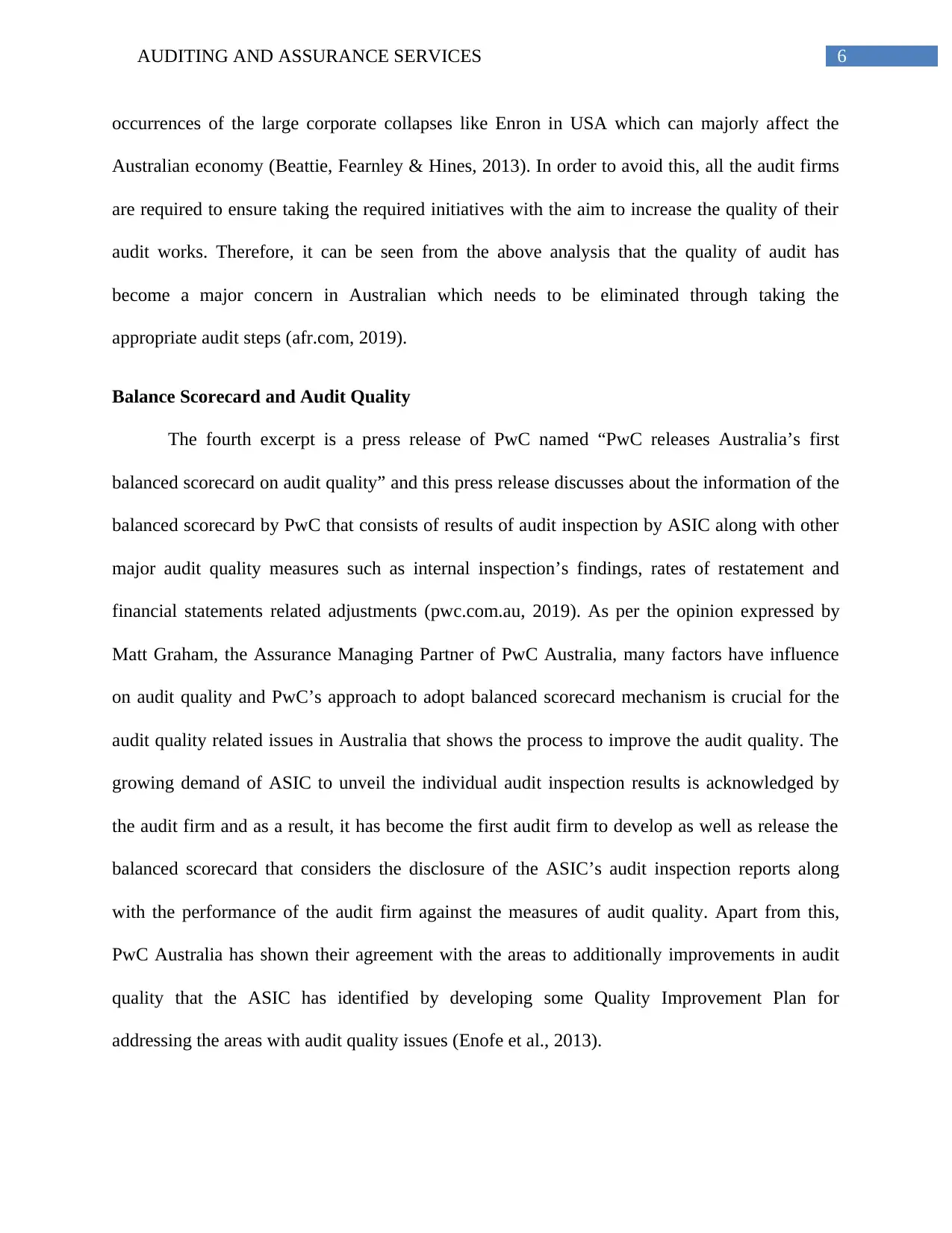
6AUDITING AND ASSURANCE SERVICES
occurrences of the large corporate collapses like Enron in USA which can majorly affect the
Australian economy (Beattie, Fearnley & Hines, 2013). In order to avoid this, all the audit firms
are required to ensure taking the required initiatives with the aim to increase the quality of their
audit works. Therefore, it can be seen from the above analysis that the quality of audit has
become a major concern in Australian which needs to be eliminated through taking the
appropriate audit steps (afr.com, 2019).
Balance Scorecard and Audit Quality
The fourth excerpt is a press release of PwC named “PwC releases Australia’s first
balanced scorecard on audit quality” and this press release discusses about the information of the
balanced scorecard by PwC that consists of results of audit inspection by ASIC along with other
major audit quality measures such as internal inspection’s findings, rates of restatement and
financial statements related adjustments (pwc.com.au, 2019). As per the opinion expressed by
Matt Graham, the Assurance Managing Partner of PwC Australia, many factors have influence
on audit quality and PwC’s approach to adopt balanced scorecard mechanism is crucial for the
audit quality related issues in Australia that shows the process to improve the audit quality. The
growing demand of ASIC to unveil the individual audit inspection results is acknowledged by
the audit firm and as a result, it has become the first audit firm to develop as well as release the
balanced scorecard that considers the disclosure of the ASIC’s audit inspection reports along
with the performance of the audit firm against the measures of audit quality. Apart from this,
PwC Australia has shown their agreement with the areas to additionally improvements in audit
quality that the ASIC has identified by developing some Quality Improvement Plan for
addressing the areas with audit quality issues (Enofe et al., 2013).
occurrences of the large corporate collapses like Enron in USA which can majorly affect the
Australian economy (Beattie, Fearnley & Hines, 2013). In order to avoid this, all the audit firms
are required to ensure taking the required initiatives with the aim to increase the quality of their
audit works. Therefore, it can be seen from the above analysis that the quality of audit has
become a major concern in Australian which needs to be eliminated through taking the
appropriate audit steps (afr.com, 2019).
Balance Scorecard and Audit Quality
The fourth excerpt is a press release of PwC named “PwC releases Australia’s first
balanced scorecard on audit quality” and this press release discusses about the information of the
balanced scorecard by PwC that consists of results of audit inspection by ASIC along with other
major audit quality measures such as internal inspection’s findings, rates of restatement and
financial statements related adjustments (pwc.com.au, 2019). As per the opinion expressed by
Matt Graham, the Assurance Managing Partner of PwC Australia, many factors have influence
on audit quality and PwC’s approach to adopt balanced scorecard mechanism is crucial for the
audit quality related issues in Australia that shows the process to improve the audit quality. The
growing demand of ASIC to unveil the individual audit inspection results is acknowledged by
the audit firm and as a result, it has become the first audit firm to develop as well as release the
balanced scorecard that considers the disclosure of the ASIC’s audit inspection reports along
with the performance of the audit firm against the measures of audit quality. Apart from this,
PwC Australia has shown their agreement with the areas to additionally improvements in audit
quality that the ASIC has identified by developing some Quality Improvement Plan for
addressing the areas with audit quality issues (Enofe et al., 2013).
Paraphrase This Document
Need a fresh take? Get an instant paraphrase of this document with our AI Paraphraser
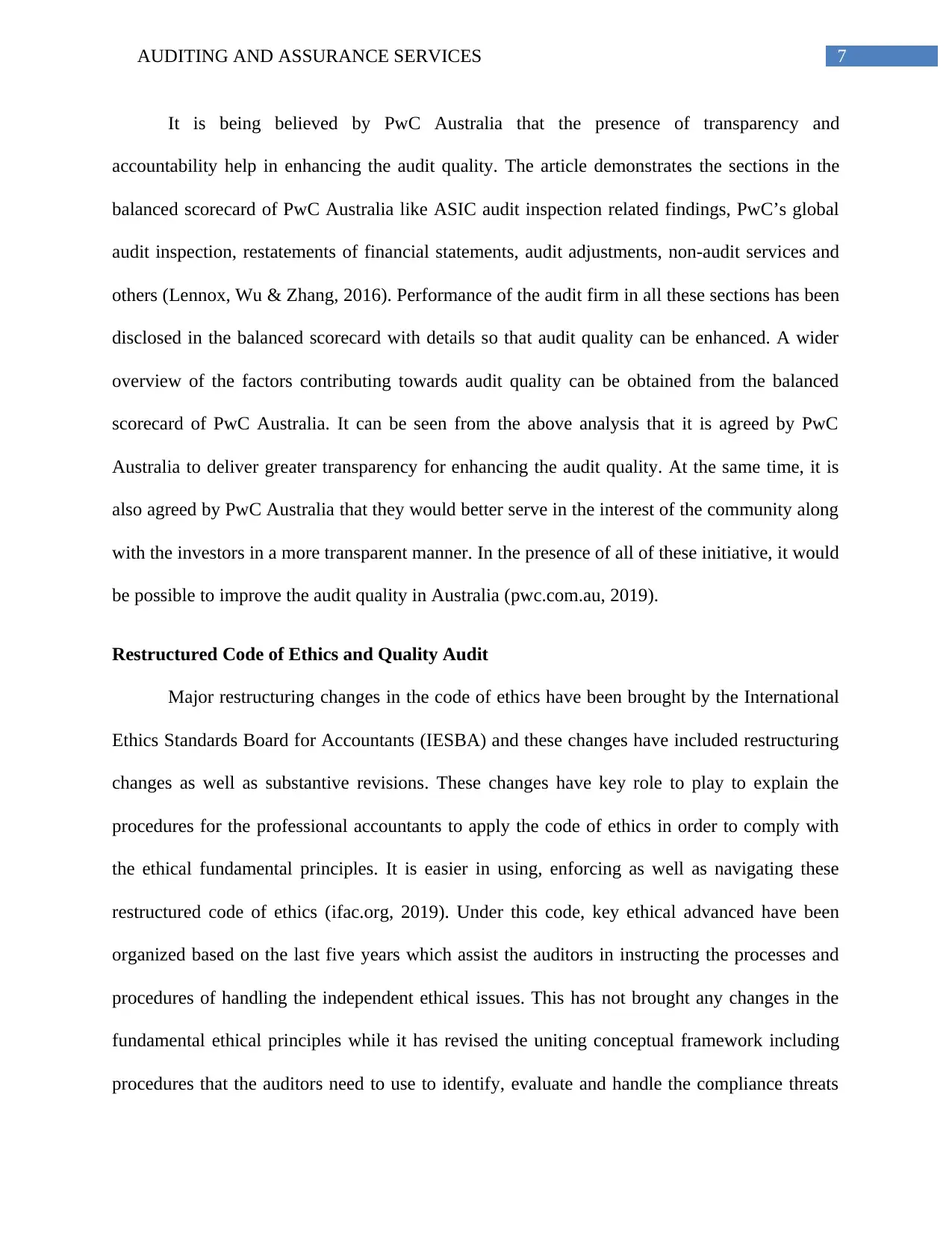
7AUDITING AND ASSURANCE SERVICES
It is being believed by PwC Australia that the presence of transparency and
accountability help in enhancing the audit quality. The article demonstrates the sections in the
balanced scorecard of PwC Australia like ASIC audit inspection related findings, PwC’s global
audit inspection, restatements of financial statements, audit adjustments, non-audit services and
others (Lennox, Wu & Zhang, 2016). Performance of the audit firm in all these sections has been
disclosed in the balanced scorecard with details so that audit quality can be enhanced. A wider
overview of the factors contributing towards audit quality can be obtained from the balanced
scorecard of PwC Australia. It can be seen from the above analysis that it is agreed by PwC
Australia to deliver greater transparency for enhancing the audit quality. At the same time, it is
also agreed by PwC Australia that they would better serve in the interest of the community along
with the investors in a more transparent manner. In the presence of all of these initiative, it would
be possible to improve the audit quality in Australia (pwc.com.au, 2019).
Restructured Code of Ethics and Quality Audit
Major restructuring changes in the code of ethics have been brought by the International
Ethics Standards Board for Accountants (IESBA) and these changes have included restructuring
changes as well as substantive revisions. These changes have key role to play to explain the
procedures for the professional accountants to apply the code of ethics in order to comply with
the ethical fundamental principles. It is easier in using, enforcing as well as navigating these
restructured code of ethics (ifac.org, 2019). Under this code, key ethical advanced have been
organized based on the last five years which assist the auditors in instructing the processes and
procedures of handling the independent ethical issues. This has not brought any changes in the
fundamental ethical principles while it has revised the uniting conceptual framework including
procedures that the auditors need to use to identify, evaluate and handle the compliance threats
It is being believed by PwC Australia that the presence of transparency and
accountability help in enhancing the audit quality. The article demonstrates the sections in the
balanced scorecard of PwC Australia like ASIC audit inspection related findings, PwC’s global
audit inspection, restatements of financial statements, audit adjustments, non-audit services and
others (Lennox, Wu & Zhang, 2016). Performance of the audit firm in all these sections has been
disclosed in the balanced scorecard with details so that audit quality can be enhanced. A wider
overview of the factors contributing towards audit quality can be obtained from the balanced
scorecard of PwC Australia. It can be seen from the above analysis that it is agreed by PwC
Australia to deliver greater transparency for enhancing the audit quality. At the same time, it is
also agreed by PwC Australia that they would better serve in the interest of the community along
with the investors in a more transparent manner. In the presence of all of these initiative, it would
be possible to improve the audit quality in Australia (pwc.com.au, 2019).
Restructured Code of Ethics and Quality Audit
Major restructuring changes in the code of ethics have been brought by the International
Ethics Standards Board for Accountants (IESBA) and these changes have included restructuring
changes as well as substantive revisions. These changes have key role to play to explain the
procedures for the professional accountants to apply the code of ethics in order to comply with
the ethical fundamental principles. It is easier in using, enforcing as well as navigating these
restructured code of ethics (ifac.org, 2019). Under this code, key ethical advanced have been
organized based on the last five years which assist the auditors in instructing the processes and
procedures of handling the independent ethical issues. This has not brought any changes in the
fundamental ethical principles while it has revised the uniting conceptual framework including
procedures that the auditors need to use to identify, evaluate and handle the compliance threats
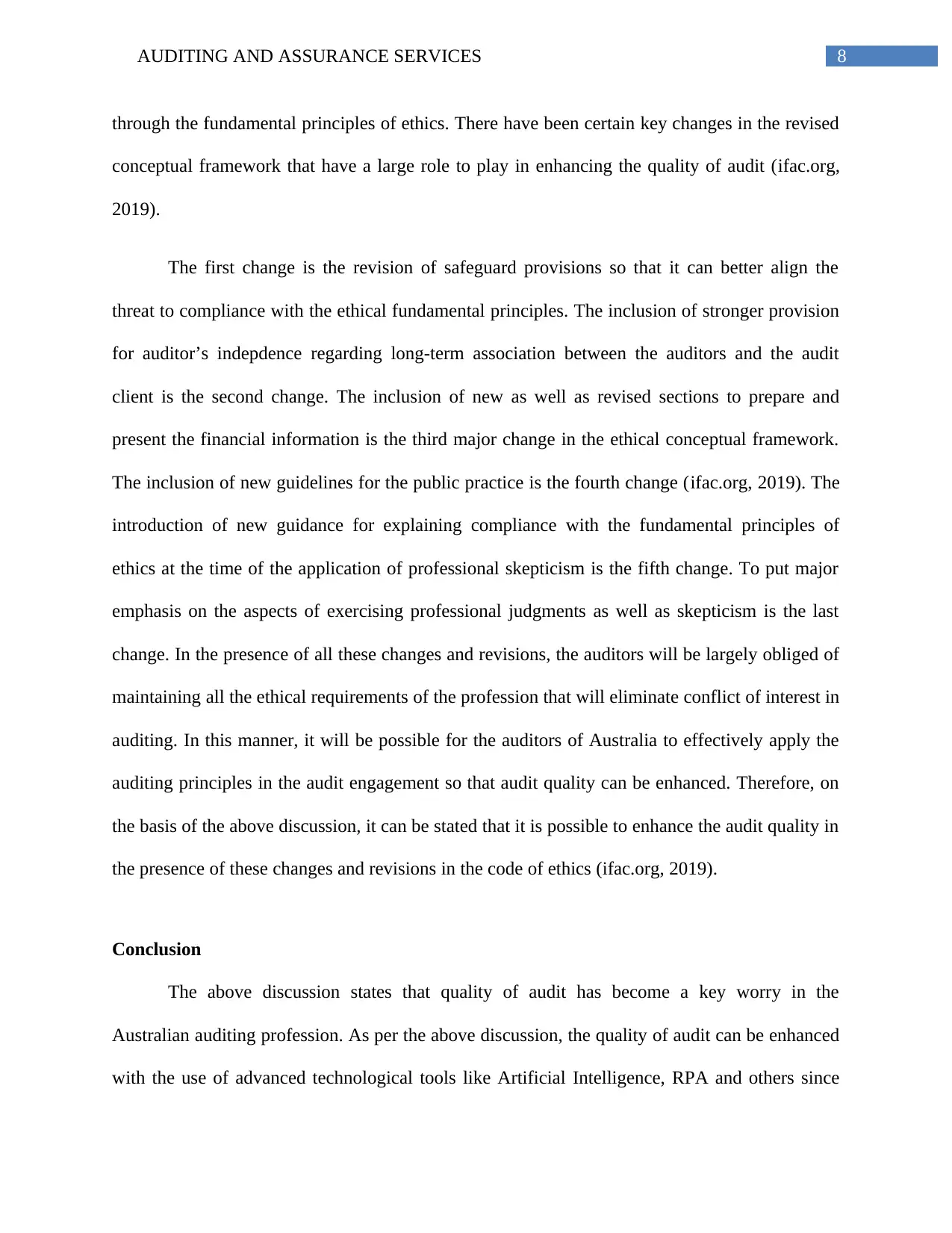
8AUDITING AND ASSURANCE SERVICES
through the fundamental principles of ethics. There have been certain key changes in the revised
conceptual framework that have a large role to play in enhancing the quality of audit (ifac.org,
2019).
The first change is the revision of safeguard provisions so that it can better align the
threat to compliance with the ethical fundamental principles. The inclusion of stronger provision
for auditor’s indepdence regarding long-term association between the auditors and the audit
client is the second change. The inclusion of new as well as revised sections to prepare and
present the financial information is the third major change in the ethical conceptual framework.
The inclusion of new guidelines for the public practice is the fourth change (ifac.org, 2019). The
introduction of new guidance for explaining compliance with the fundamental principles of
ethics at the time of the application of professional skepticism is the fifth change. To put major
emphasis on the aspects of exercising professional judgments as well as skepticism is the last
change. In the presence of all these changes and revisions, the auditors will be largely obliged of
maintaining all the ethical requirements of the profession that will eliminate conflict of interest in
auditing. In this manner, it will be possible for the auditors of Australia to effectively apply the
auditing principles in the audit engagement so that audit quality can be enhanced. Therefore, on
the basis of the above discussion, it can be stated that it is possible to enhance the audit quality in
the presence of these changes and revisions in the code of ethics (ifac.org, 2019).
Conclusion
The above discussion states that quality of audit has become a key worry in the
Australian auditing profession. As per the above discussion, the quality of audit can be enhanced
with the use of advanced technological tools like Artificial Intelligence, RPA and others since
through the fundamental principles of ethics. There have been certain key changes in the revised
conceptual framework that have a large role to play in enhancing the quality of audit (ifac.org,
2019).
The first change is the revision of safeguard provisions so that it can better align the
threat to compliance with the ethical fundamental principles. The inclusion of stronger provision
for auditor’s indepdence regarding long-term association between the auditors and the audit
client is the second change. The inclusion of new as well as revised sections to prepare and
present the financial information is the third major change in the ethical conceptual framework.
The inclusion of new guidelines for the public practice is the fourth change (ifac.org, 2019). The
introduction of new guidance for explaining compliance with the fundamental principles of
ethics at the time of the application of professional skepticism is the fifth change. To put major
emphasis on the aspects of exercising professional judgments as well as skepticism is the last
change. In the presence of all these changes and revisions, the auditors will be largely obliged of
maintaining all the ethical requirements of the profession that will eliminate conflict of interest in
auditing. In this manner, it will be possible for the auditors of Australia to effectively apply the
auditing principles in the audit engagement so that audit quality can be enhanced. Therefore, on
the basis of the above discussion, it can be stated that it is possible to enhance the audit quality in
the presence of these changes and revisions in the code of ethics (ifac.org, 2019).
Conclusion
The above discussion states that quality of audit has become a key worry in the
Australian auditing profession. As per the above discussion, the quality of audit can be enhanced
with the use of advanced technological tools like Artificial Intelligence, RPA and others since
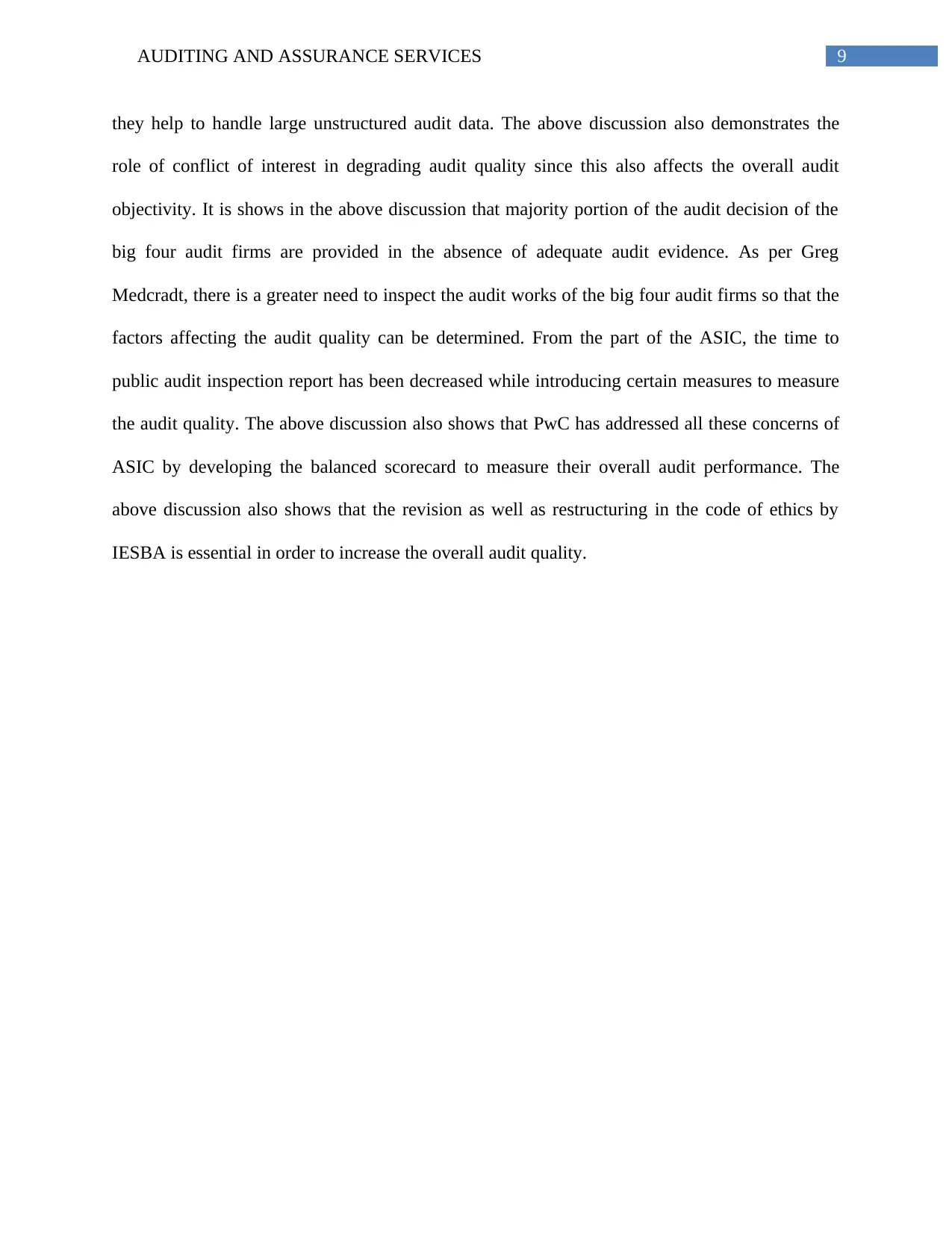
9AUDITING AND ASSURANCE SERVICES
they help to handle large unstructured audit data. The above discussion also demonstrates the
role of conflict of interest in degrading audit quality since this also affects the overall audit
objectivity. It is shows in the above discussion that majority portion of the audit decision of the
big four audit firms are provided in the absence of adequate audit evidence. As per Greg
Medcradt, there is a greater need to inspect the audit works of the big four audit firms so that the
factors affecting the audit quality can be determined. From the part of the ASIC, the time to
public audit inspection report has been decreased while introducing certain measures to measure
the audit quality. The above discussion also shows that PwC has addressed all these concerns of
ASIC by developing the balanced scorecard to measure their overall audit performance. The
above discussion also shows that the revision as well as restructuring in the code of ethics by
IESBA is essential in order to increase the overall audit quality.
they help to handle large unstructured audit data. The above discussion also demonstrates the
role of conflict of interest in degrading audit quality since this also affects the overall audit
objectivity. It is shows in the above discussion that majority portion of the audit decision of the
big four audit firms are provided in the absence of adequate audit evidence. As per Greg
Medcradt, there is a greater need to inspect the audit works of the big four audit firms so that the
factors affecting the audit quality can be determined. From the part of the ASIC, the time to
public audit inspection report has been decreased while introducing certain measures to measure
the audit quality. The above discussion also shows that PwC has addressed all these concerns of
ASIC by developing the balanced scorecard to measure their overall audit performance. The
above discussion also shows that the revision as well as restructuring in the code of ethics by
IESBA is essential in order to increase the overall audit quality.
Secure Best Marks with AI Grader
Need help grading? Try our AI Grader for instant feedback on your assignments.
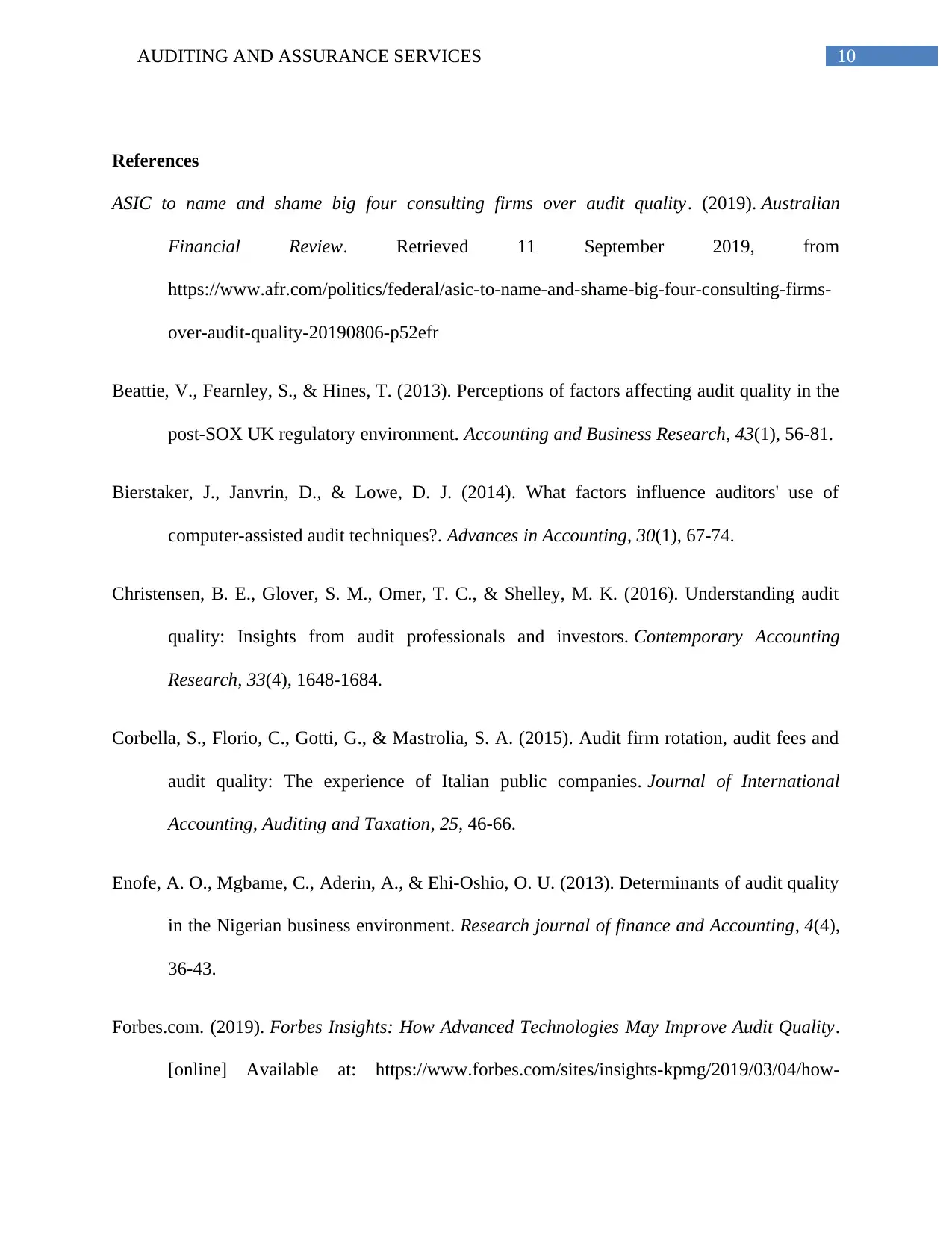
10AUDITING AND ASSURANCE SERVICES
References
ASIC to name and shame big four consulting firms over audit quality. (2019). Australian
Financial Review. Retrieved 11 September 2019, from
https://www.afr.com/politics/federal/asic-to-name-and-shame-big-four-consulting-firms-
over-audit-quality-20190806-p52efr
Beattie, V., Fearnley, S., & Hines, T. (2013). Perceptions of factors affecting audit quality in the
post-SOX UK regulatory environment. Accounting and Business Research, 43(1), 56-81.
Bierstaker, J., Janvrin, D., & Lowe, D. J. (2014). What factors influence auditors' use of
computer-assisted audit techniques?. Advances in Accounting, 30(1), 67-74.
Christensen, B. E., Glover, S. M., Omer, T. C., & Shelley, M. K. (2016). Understanding audit
quality: Insights from audit professionals and investors. Contemporary Accounting
Research, 33(4), 1648-1684.
Corbella, S., Florio, C., Gotti, G., & Mastrolia, S. A. (2015). Audit firm rotation, audit fees and
audit quality: The experience of Italian public companies. Journal of International
Accounting, Auditing and Taxation, 25, 46-66.
Enofe, A. O., Mgbame, C., Aderin, A., & Ehi-Oshio, O. U. (2013). Determinants of audit quality
in the Nigerian business environment. Research journal of finance and Accounting, 4(4),
36-43.
Forbes.com. (2019). Forbes Insights: How Advanced Technologies May Improve Audit Quality.
[online] Available at: https://www.forbes.com/sites/insights-kpmg/2019/03/04/how-
References
ASIC to name and shame big four consulting firms over audit quality. (2019). Australian
Financial Review. Retrieved 11 September 2019, from
https://www.afr.com/politics/federal/asic-to-name-and-shame-big-four-consulting-firms-
over-audit-quality-20190806-p52efr
Beattie, V., Fearnley, S., & Hines, T. (2013). Perceptions of factors affecting audit quality in the
post-SOX UK regulatory environment. Accounting and Business Research, 43(1), 56-81.
Bierstaker, J., Janvrin, D., & Lowe, D. J. (2014). What factors influence auditors' use of
computer-assisted audit techniques?. Advances in Accounting, 30(1), 67-74.
Christensen, B. E., Glover, S. M., Omer, T. C., & Shelley, M. K. (2016). Understanding audit
quality: Insights from audit professionals and investors. Contemporary Accounting
Research, 33(4), 1648-1684.
Corbella, S., Florio, C., Gotti, G., & Mastrolia, S. A. (2015). Audit firm rotation, audit fees and
audit quality: The experience of Italian public companies. Journal of International
Accounting, Auditing and Taxation, 25, 46-66.
Enofe, A. O., Mgbame, C., Aderin, A., & Ehi-Oshio, O. U. (2013). Determinants of audit quality
in the Nigerian business environment. Research journal of finance and Accounting, 4(4),
36-43.
Forbes.com. (2019). Forbes Insights: How Advanced Technologies May Improve Audit Quality.
[online] Available at: https://www.forbes.com/sites/insights-kpmg/2019/03/04/how-
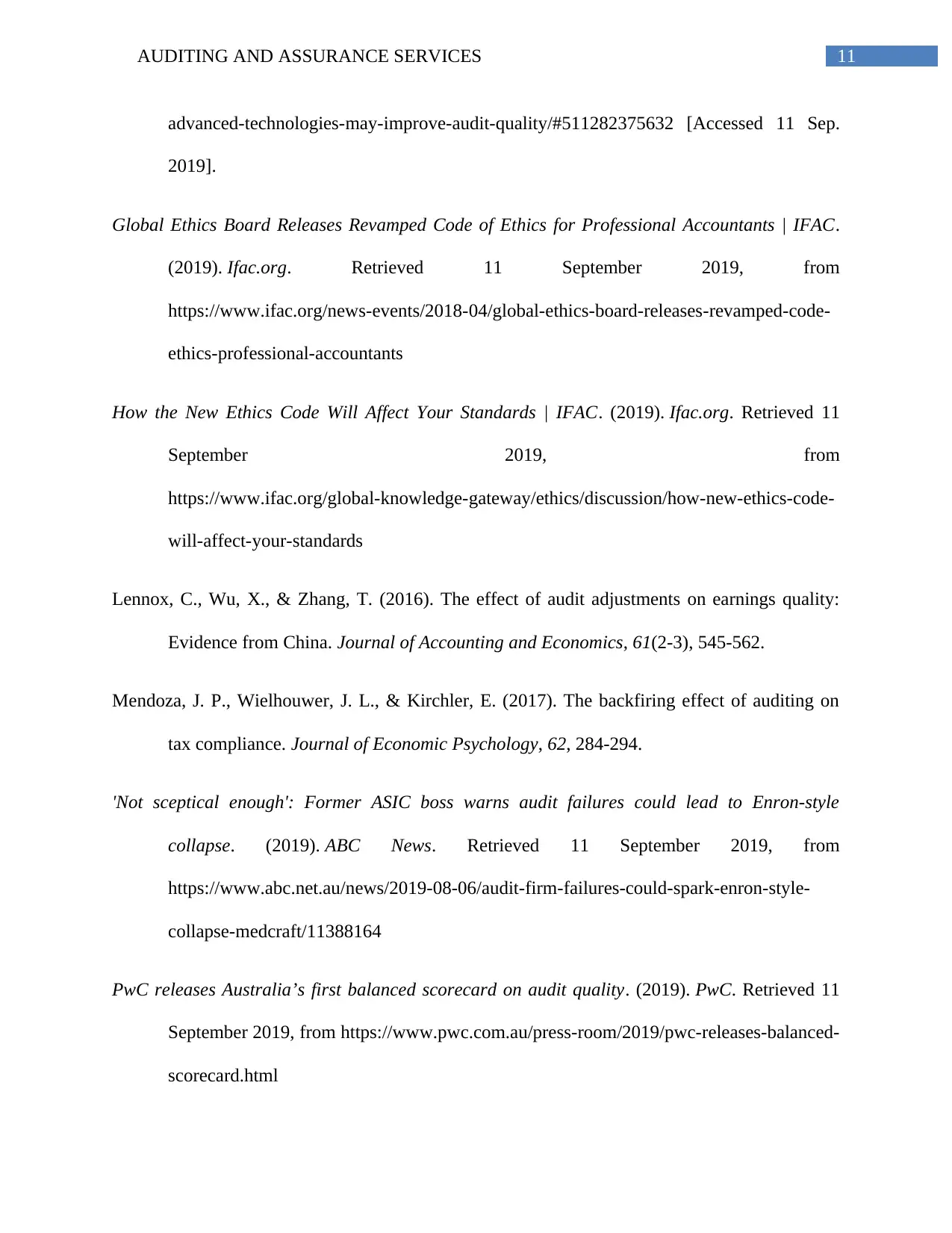
11AUDITING AND ASSURANCE SERVICES
advanced-technologies-may-improve-audit-quality/#511282375632 [Accessed 11 Sep.
2019].
Global Ethics Board Releases Revamped Code of Ethics for Professional Accountants | IFAC.
(2019). Ifac.org. Retrieved 11 September 2019, from
https://www.ifac.org/news-events/2018-04/global-ethics-board-releases-revamped-code-
ethics-professional-accountants
How the New Ethics Code Will Affect Your Standards | IFAC. (2019). Ifac.org. Retrieved 11
September 2019, from
https://www.ifac.org/global-knowledge-gateway/ethics/discussion/how-new-ethics-code-
will-affect-your-standards
Lennox, C., Wu, X., & Zhang, T. (2016). The effect of audit adjustments on earnings quality:
Evidence from China. Journal of Accounting and Economics, 61(2-3), 545-562.
Mendoza, J. P., Wielhouwer, J. L., & Kirchler, E. (2017). The backfiring effect of auditing on
tax compliance. Journal of Economic Psychology, 62, 284-294.
'Not sceptical enough': Former ASIC boss warns audit failures could lead to Enron-style
collapse. (2019). ABC News. Retrieved 11 September 2019, from
https://www.abc.net.au/news/2019-08-06/audit-firm-failures-could-spark-enron-style-
collapse-medcraft/11388164
PwC releases Australia’s first balanced scorecard on audit quality. (2019). PwC. Retrieved 11
September 2019, from https://www.pwc.com.au/press-room/2019/pwc-releases-balanced-
scorecard.html
advanced-technologies-may-improve-audit-quality/#511282375632 [Accessed 11 Sep.
2019].
Global Ethics Board Releases Revamped Code of Ethics for Professional Accountants | IFAC.
(2019). Ifac.org. Retrieved 11 September 2019, from
https://www.ifac.org/news-events/2018-04/global-ethics-board-releases-revamped-code-
ethics-professional-accountants
How the New Ethics Code Will Affect Your Standards | IFAC. (2019). Ifac.org. Retrieved 11
September 2019, from
https://www.ifac.org/global-knowledge-gateway/ethics/discussion/how-new-ethics-code-
will-affect-your-standards
Lennox, C., Wu, X., & Zhang, T. (2016). The effect of audit adjustments on earnings quality:
Evidence from China. Journal of Accounting and Economics, 61(2-3), 545-562.
Mendoza, J. P., Wielhouwer, J. L., & Kirchler, E. (2017). The backfiring effect of auditing on
tax compliance. Journal of Economic Psychology, 62, 284-294.
'Not sceptical enough': Former ASIC boss warns audit failures could lead to Enron-style
collapse. (2019). ABC News. Retrieved 11 September 2019, from
https://www.abc.net.au/news/2019-08-06/audit-firm-failures-could-spark-enron-style-
collapse-medcraft/11388164
PwC releases Australia’s first balanced scorecard on audit quality. (2019). PwC. Retrieved 11
September 2019, from https://www.pwc.com.au/press-room/2019/pwc-releases-balanced-
scorecard.html
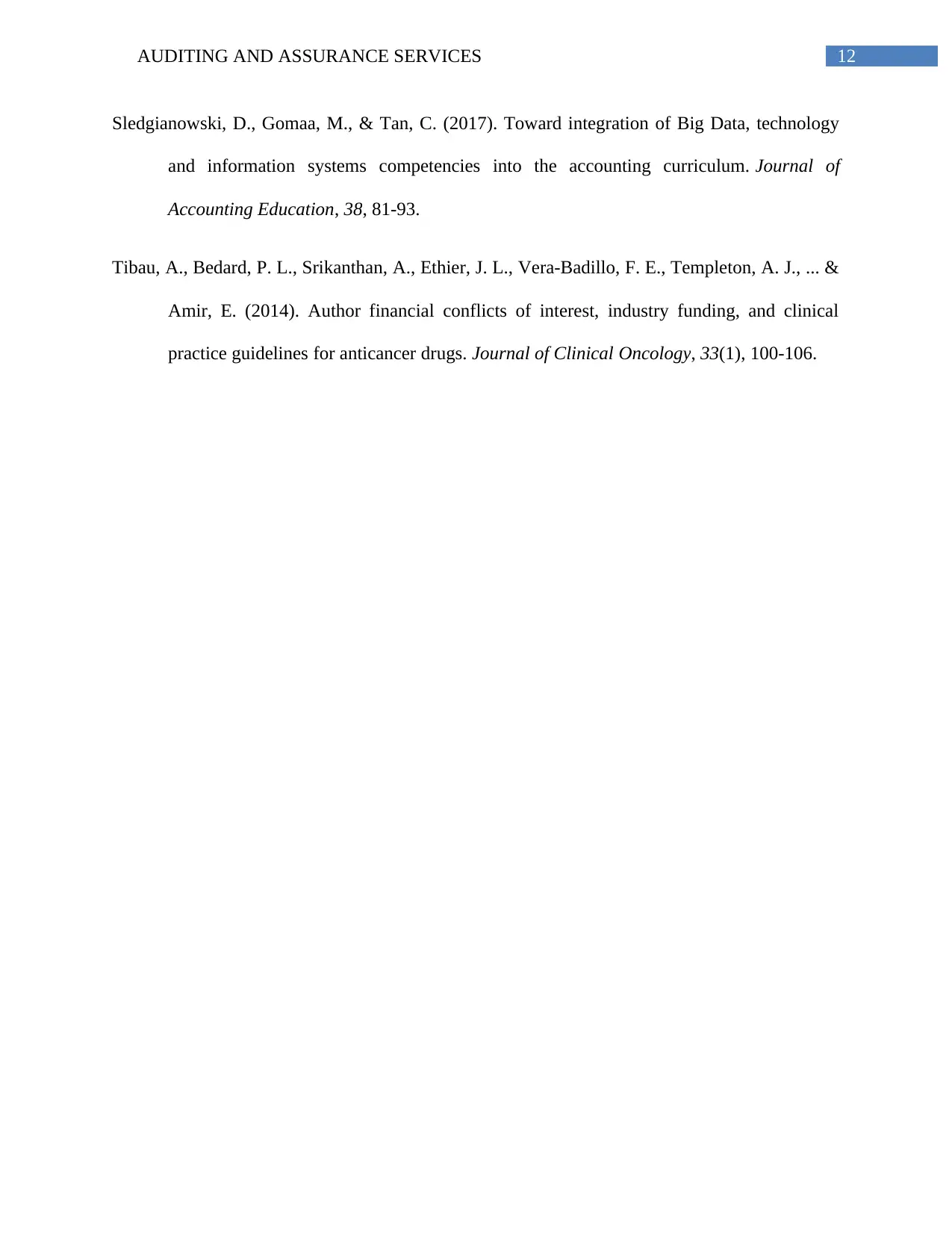
12AUDITING AND ASSURANCE SERVICES
Sledgianowski, D., Gomaa, M., & Tan, C. (2017). Toward integration of Big Data, technology
and information systems competencies into the accounting curriculum. Journal of
Accounting Education, 38, 81-93.
Tibau, A., Bedard, P. L., Srikanthan, A., Ethier, J. L., Vera-Badillo, F. E., Templeton, A. J., ... &
Amir, E. (2014). Author financial conflicts of interest, industry funding, and clinical
practice guidelines for anticancer drugs. Journal of Clinical Oncology, 33(1), 100-106.
Sledgianowski, D., Gomaa, M., & Tan, C. (2017). Toward integration of Big Data, technology
and information systems competencies into the accounting curriculum. Journal of
Accounting Education, 38, 81-93.
Tibau, A., Bedard, P. L., Srikanthan, A., Ethier, J. L., Vera-Badillo, F. E., Templeton, A. J., ... &
Amir, E. (2014). Author financial conflicts of interest, industry funding, and clinical
practice guidelines for anticancer drugs. Journal of Clinical Oncology, 33(1), 100-106.
1 out of 13
Related Documents
Your All-in-One AI-Powered Toolkit for Academic Success.
+13062052269
info@desklib.com
Available 24*7 on WhatsApp / Email
![[object Object]](/_next/static/media/star-bottom.7253800d.svg)
Unlock your academic potential
© 2024 | Zucol Services PVT LTD | All rights reserved.





